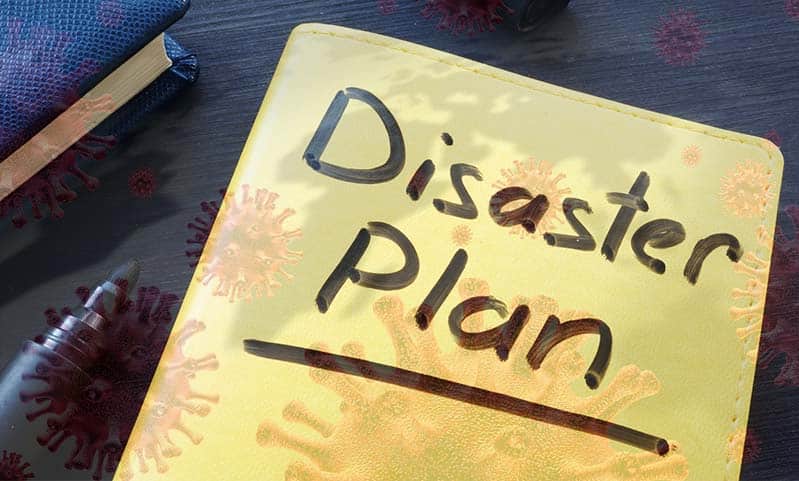Experts predict that the 2020 Atlantic storm season will be more active than usual, disaster plan with the lingering COVID-19 pandemic will make things worse.
Forecasters at the National Oceanic and Atmospheric Administration expect up to nineteen named storms, including six hurricanes classified at Category 3 or higher.
Traditional disaster plans include large evacuation sites, such as schools and hospitals.
Social distancing and other requirements make these plans completely unfeasible.
Therefore, instead of large shelters, the Red Cross is “prioritizing individual hotel rooms or dormitory-style rooms to make sure people have a safe place to stay if they can’t return home after a disaster,” according to a spokesperson.
Coronavirus affects individual preparedness as well. The Red Cross advised people to take a good look at their emergency supplies.
A stay-at-home kit should have at least two weeks of supplies.
Many items, such as disinfectant, might already be in short supply. Additionally, if your family does not have a portable generator, the Red Cross suggests you acquire one.
Families should also have a three-day evacuation supply kit. This kit should be a scaled-down version of the stay-at-home kit.
Finally, if you are in charge of a shelter, make sure it is COVID-19 compliant.
For example, include health and wellness screenings for all shelter occupants. Additionally, set up an isolation area for infected individuals. Overall, face masks are good, but they do not substitute for social distancing.
Insurance Claims: Picking Up the Pieces After a Disaster
Despite what television commercial jingles state, the insurance company is not “on your side” following a disaster.
These firms make money by collecting premiums. They lose money when they pay claims. That simple economic reality affects everything that happens when insured parties file claims.
After a hurricane or other natural disaster, most homeowners and business owners count on insurance payments to help them rebuild. Indeed, insurance companies have a legal duty to quickly investigate and pay such claims.
However, many insurance companies do not take their responsibilities seriously in this area.
Many insurance companies use large disasters as an excuse to delay investigation and payment.
But legally, this excuse does not hold water. Generally, insurance companies still have a duty to:
- Acknowledge the claim within a week,
- Launch an investigation within a month, and
- Pay or deny the claim within sixty days.
Generally, insurance companies bear the entire financial risk.
Things like depreciation and market conditions do not affect the property’s insured value. If a home is insured for $200,000, the fair market value prior to the disaster is irrelevant.
The insurance company must pay the full insured amount.
If the insurance company does not live up to its legal responsibilities and the insured party must work with an attorney, the insurance company is generally responsible for legal fees.
At Napoli Shkolnik, we helped hundreds of New Yorkers in the wake of Hurricane Sandy. So, we are well-positioned to help you as well.
COVID-19 Business Interruption Insurance Claims
Homeowners’ and business insurance policies usually cover both natural disasters, like fires, and man-made disasters, such as theft. There is some debate as to whether the coronavirus pandemic was a natural or man-made disaster.
Either way, however, business interruption insurance should apply to COVID-19-related losses.
But most insurance companies have refused to pay these claims.
Business interruption coverage varies in different policies. Typically, however, covered losses include:
- Physical Damage: Virus damage is nothing like fire or flood damage. However, the coronavirus lives on surfaces for several hours or several days. Therefore, the physical damage is sufficient to force the business to close. That level of damage is arguably all that’s necessary to trigger policy payment.
- Civil Action: These clauses typically apply to wars and other extreme unrest. Insurance companies never thought they would have to pay such claims. That’s probably why they are so reluctant to make good on them. Furthermore, if the insured property was a restaurant, insurance companies often claim the business was technically open, or could have been open, during coronavirus lockdowns.
In the wake of the 2002 SARS outbreak, some insurance companies revised business interruption policies to exclude infectious disease-related losses. If your carrier made no such alterations, your claim for damages is stronger.
Frequently, insurance companies are legally based in a foreign country. Therefore, these matters are quite complex.
Bad faith insurance practices make bad situations much worse. For a free consultation with an experienced natural disaster attorney in New York, contact Napoli Shkolnik PLLC.
